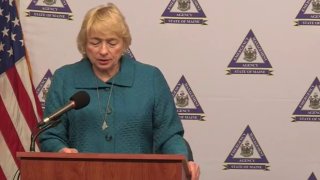
Maine Gov. Janet Mills proposed returning to the people about half of an anticipated $822 million surplus on Thursday — the same day the federal government announced inflation had grown to its highest rate in four decades.
The givebacks amount to about $500 per person and will be distributed to 800,000 taxpayers, she said.
Delivering her State of the State address in person at the State House in Augusta for the first time in two years, the Democrat declared "it's good to be back" as she promised a new approach to keeping people safe during the pandemic — welcome news to critics of her emergency orders.
"Last year's emergency measures no longer serve the purposes they once did, nor should they. As science and trends evolve, our response evolves as well. Today, we focus not on telling people what they cannot do. We focus on telling people what they can and should do," she said.
Mills has yet to unveil her supplemental budget but said she agreed with Republicans who want to return half the anticipated budget surplus – $411 million – to Maine residents amid worries about the growing cost of food, gas and other staples. The move has the support of GOP lawmakers in both chambers, and the announcement drew applause.
The governor said she also aims to spend another $50 million to help pandemic-depleted Maine hospitals and nursing homes.
And she surprised lawmakers by vowing that every Mainer who wants high-speed internet will have it by 2024.
On education, Mills said she wants to provide $20 million for free community college tuition for about 8,000 qualified students who were part of high school graduating classes from 2020 through 2023. And she proposed funding to stave off tuition increases in the University of Maine System.
She also wants to provide funding to turn the Opportunity Maine Tax Credit into a debt relief tool to attract college graduates to live in Maine.
Among other proposals, she suggested increasing pay for child care workers and early childhood educators, creating an education stabilization fund, and creating an experiential learning program for students.
Republicans said the massive flow of federal pandemic aid is the reason for much of Mills' success during the pandemic, and they were happy to see she was heeding their desire to return some of it to the people.
Her address came against a backdrop of signs that the omicron variant that swept across the state may be slowing, and a looming reelection battle against former Republican Gov. Paul LePage.
The governor delivered the address to a joint session of the Legislature, the first time since 2020, before the pandemic struck. Last year, the governor delivered a pre-recorded address virtually.
While acknowledging more than 1,800 pandemic deaths in Maine, she praised residents for making Maine one of the most heavily vaccinated states and noted that the state has one of the lowest rates of deaths.
"Our presence in this chamber tonight is a sign of progress, of recovery — a step forward in our march towards normalcy and stability, especially from where we have been," the governor said.



